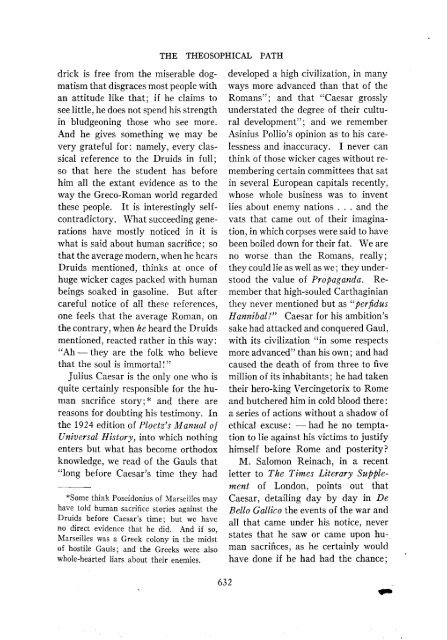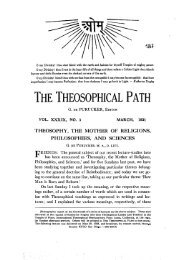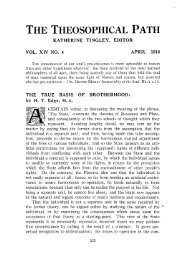theosophy, the mother of religions, philosophies, and sciences
theosophy, the mother of religions, philosophies, and sciences
theosophy, the mother of religions, philosophies, and sciences
Create successful ePaper yourself
Turn your PDF publications into a flip-book with our unique Google optimized e-Paper software.
drick is free from <strong>the</strong> miserable dog-<br />
matism that disgraces most people with<br />
an attitude like that; if he claims to<br />
see little, he does not spend his strength<br />
in bludgeoning those who see more.<br />
And he gives something we may be<br />
very grateful for: namely, every clas-<br />
sical reference to <strong>the</strong> Druids in full;<br />
so that here <strong>the</strong> student has before<br />
him all <strong>the</strong> extant evidence as to <strong>the</strong><br />
way <strong>the</strong> Greco-Roman world regarded<br />
<strong>the</strong>se people. It is interestingly self-<br />
contradictory. What succeeding gene-<br />
rations have mostly noticed in it is<br />
what is said about human sacrifice; so<br />
that <strong>the</strong> average modern, when he hears<br />
Druids mentioned, thinks at once <strong>of</strong><br />
huge wicker cages packed with human<br />
beings soaked in gasoline. But after<br />
careful notice <strong>of</strong> all <strong>the</strong>se references,<br />
one feels that <strong>the</strong> average Roman, on<br />
<strong>the</strong> contrary, when he heard <strong>the</strong> Druids<br />
mentioned, reacted ra<strong>the</strong>r in this way:<br />
"Ah - <strong>the</strong>y are <strong>the</strong> folk who believe<br />
that <strong>the</strong> soul is immortal!"<br />
Julius Caesar is <strong>the</strong> only one who is<br />
quite certainly responsible for <strong>the</strong> hu-<br />
man sacrifice story;* <strong>and</strong> <strong>the</strong>re are<br />
reasons for doubting his testimony. In<br />
<strong>the</strong> 1924 edition <strong>of</strong> Ploetz's Manual <strong>of</strong><br />
Universal History, into which nothing<br />
enters but what has become orthodox<br />
knowledge, we read <strong>of</strong> <strong>the</strong> Gauls that<br />
"long before Caesar's time <strong>the</strong>y had<br />
*Some think Poseidonius <strong>of</strong> Marseilles may<br />
have told human sacrifice stories against <strong>the</strong><br />
Druids before Caesar's time; but we have<br />
no direct evidence that he did. And if so,<br />
Marseilles was a Greek colony in <strong>the</strong> midst<br />
<strong>of</strong> hostile Gauls; <strong>and</strong> <strong>the</strong> Greeks were also<br />
whole-hearted liars about <strong>the</strong>ir enemies.<br />
THE THEOSOPHICAL PATH<br />
developed a high civilization, in many<br />
ways more advanced than that <strong>of</strong> <strong>the</strong><br />
Romans"; <strong>and</strong> that "Caesar grossly<br />
understated <strong>the</strong> degree <strong>of</strong> <strong>the</strong>ir cultu-<br />
ral development"; <strong>and</strong> we remember<br />
Asinius Pollio's opinion as to his care-<br />
lessness <strong>and</strong> inaccuracy. I never can<br />
think <strong>of</strong> those wicker cages without re-<br />
membering certain committees that sat<br />
in several European capitals recently,<br />
whose whole business was to invent<br />
lies about enemy nations . . . <strong>and</strong> <strong>the</strong><br />
vats that came out <strong>of</strong> <strong>the</strong>ir imagina-<br />
tion, in which corpses were said to have<br />
been boiled down for <strong>the</strong>ir fat. We are<br />
no worse than <strong>the</strong> Romans, really;<br />
<strong>the</strong>y could lie as well as we; <strong>the</strong>y under-<br />
stood <strong>the</strong> value <strong>of</strong> Propag<strong>and</strong>a. Re-<br />
member that high-souled Carthaginian<br />
<strong>the</strong>y never mentioned but as "perfidus<br />
Hannibal!" Caesar for his ambition's<br />
sake had attacked <strong>and</strong> conquered Gaul,<br />
with its civilization "in some respects<br />
more advanced" than his own; <strong>and</strong> had<br />
caused <strong>the</strong> death <strong>of</strong> from three to five<br />
million <strong>of</strong> its inhabitants; he had taken<br />
<strong>the</strong>ir hero-king Vercingetorix to Rome<br />
<strong>and</strong> butchered him in cold blood <strong>the</strong>re:<br />
a series <strong>of</strong> actions without a shadow <strong>of</strong><br />
ethical excuse: - had he no tempta-<br />
tion to lie against his victims to justify<br />
himself before Rome <strong>and</strong> posterity?<br />
M. Salomon Reinach, in a recent<br />
letter to The Times Literary Supple-<br />
ment <strong>of</strong> London, points out that<br />
Caesar, detailing day by day in De<br />
Bello Gallico <strong>the</strong> events <strong>of</strong> <strong>the</strong> war <strong>and</strong><br />
all that came under his notice, never<br />
states that he saw or came upon hu-<br />
man sacrifices, as he certainly would<br />
have done if he had had <strong>the</strong> chance;













